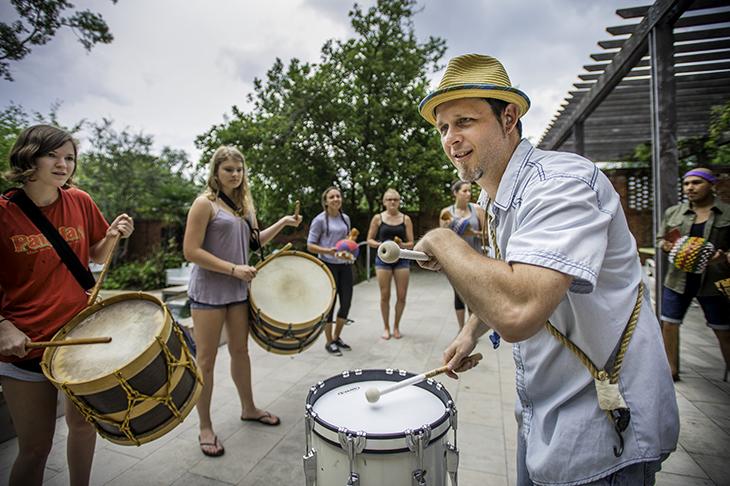South America meets American South
The rhythmic sound of instruments native to northeastern Brazil joined in unison Wednesday (April 27) to emulate the Afro-Brazilian genre of the maracatu during a percussion and dance workshop on the uptown campus.
The workshop was part of “Black Atlantic Grooves: Carnival Music from New Orleans and Afro-Brazil” and was led by Scott Kettner of Nation Beat, which conducts educational outreach exploring the cultural exchange between the American South and South America.
“I started Nation Beat in 2002 after living in Brazil and studying the maracatu style of music,” says Kettner, who is a percussionist and educator by profession. “I soon realized a similarity between music in New Orleans and music brought by slaves to Brazil.”
Kettner, a native of Florida, describes the music as being processional and having a level of pageantry much like the music of a Southern second-line or the chants heard and imagery seen in the rituals of Mardi Gras Indian tribes.
To help show the similarity, Kettner called upon the help of Irvin “Honey” Banister, “Spy Boy” for the Creole Wild West Mardi Gras Indians during one of the day’s sessions.
“The slaves in Brazil had crowning ceremonies where they would process through the street with drums, but at some point the Portuguese government no longer allowed them to do it,” says Kettner. “In order to keep their ceremony they came up with a way to dress that made the government believe they were honoring them when instead they were mocking them.”
Rebecca Snedeker, Clark Executive Director of the New Orleans Center for the Gulf South, says the programming was done in partnership with the Stone Center for Latin American Studies, the Africana Studies program, the Department of Music, and the Office of Multicultural Affairs.
“The goal is to further our understanding of how the cultural and economic patterns of the African diaspora, ongoing history of the slave trade, and dynamics of habitation in river delta regions all circulate in our lives locally and globally,” says Snedeker.

